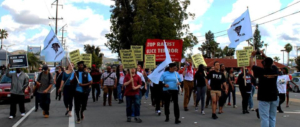 Some six months after Alfred Olango was killed by police officer Dick Gonsalves on October 8, 2016, the streets of El Cajon continue to echo with cries for justice.
Some six months after Alfred Olango was killed by police officer Dick Gonsalves on October 8, 2016, the streets of El Cajon continue to echo with cries for justice.
The small working-class city, just east of San Diego, has long suffered under the corrupt local government and organized white nationalist gangs that claim it as their territory. In living memory, the town was essentially “whites only.” Olango’s killing and its aftermath prove two things: one, that the El Cajon Police Department still thinks that they can lynch community members with impunity. And two, that they are dead wrong.
The city government hoped that the public outrage over Gonsalves’ killing of the unarmed Olango, a refugee from Uganda, would blow over in a few days. On the contrary, the incident galvanized the El Cajon community against police violence and sparked a significant struggle and movement for justice.
The Olango Village, a coalition of organizations and activists operating in El Cajon, has kept the pressure on the city for over half a year. Several community members who had never been involved in politics or organizing before have joined radical organizations, including the Party for Socialism and Liberation, and continue to work daily to build the resistance.
The demonstration on the April 8 was called by Olango’s family and the local chapter of the Black Panthers, with the PSL endorsing and lending material support. After rallying at the site of Olango’s slaying, the marchers faced down racist slurs and threats of violence from police and reactionary elements of the public as they took the streets and marched to the local police station to file formal complaints with the department.
Of course, the police were too frightened to face the citizenry and locked the station doors.
Demonstrators used an emergency intercom to plead their case, but the cowards inside wouldn’t even answer through the speaker.
Despite the sorrow Olango’s friends, family, and neighbors felt, the mood was one of anger as speakers addressed the crowd.
Some called for letter-writing campaigns and lawsuits to root the “bad apples” out of the police force. But others emphasized that racist police violence isn’t carried out by cops who are failing in their duties, but by those who are carrying out their duties perfectly.
“The police don’t exist to protect you,” one speaker said, “They exist to protect the interests of the rich. A ‘good’ cop, a cop who is doing his job well, looks at you and sees an enemy. Looks at a group of Black folks on a street corner and doesn’t see people living their lives, but sees a problem
that needs to be solved.”
Another speaker emphasized that racism within the borders of the U.S. is just one part of a global imperialist system that has enriched a few by extracting labor and resources from Africa and Africans for hundreds of years.
Just a few years ago, nobody would have thought that revolutionary politics would catch a foothold in El Cajon. But as openly fascist and militantly racist voices are emboldened, the resistance is growing everywhere. Working people in El Cajon recognize the threat, just as working people do throughout the country and the world.





